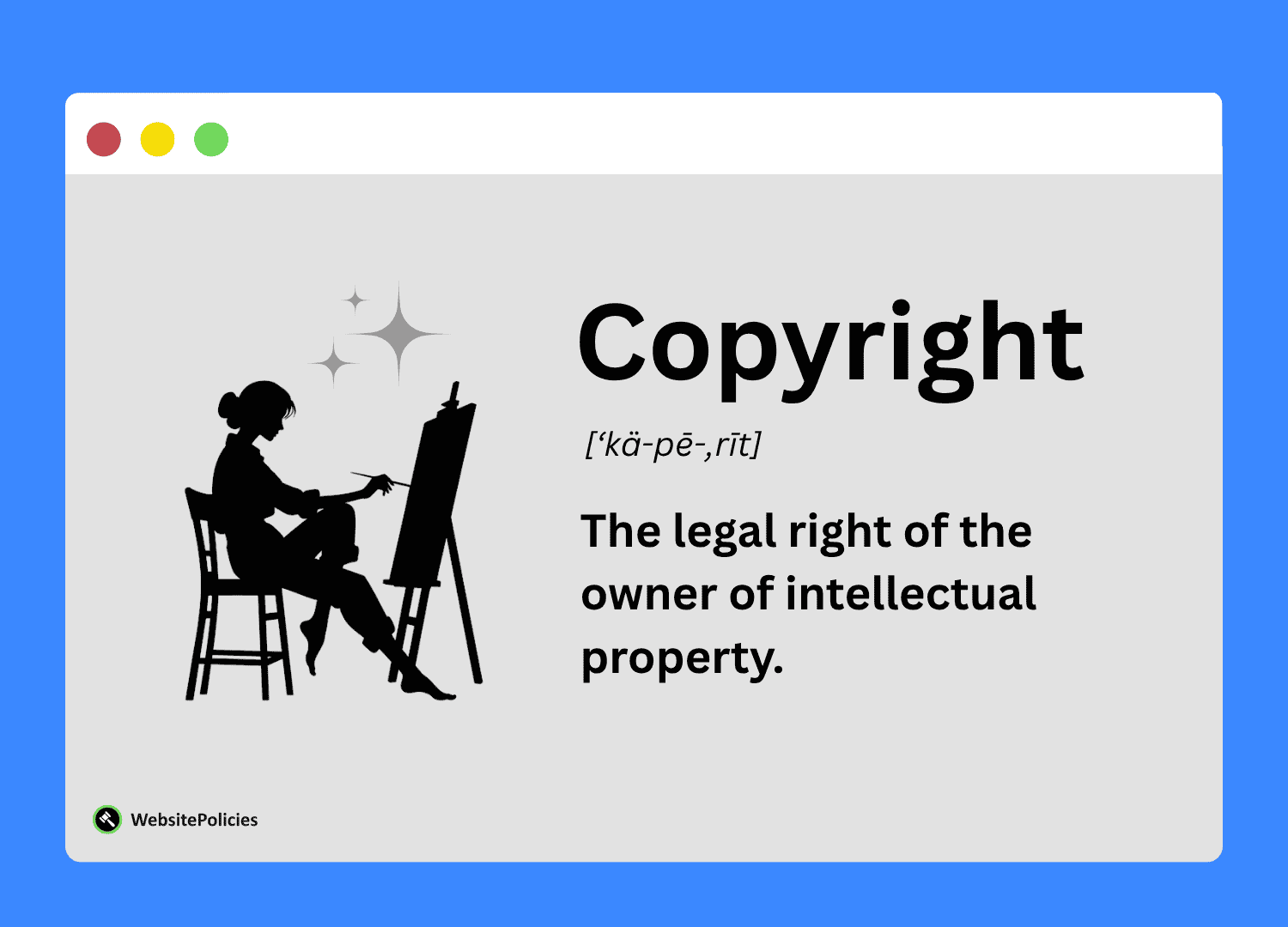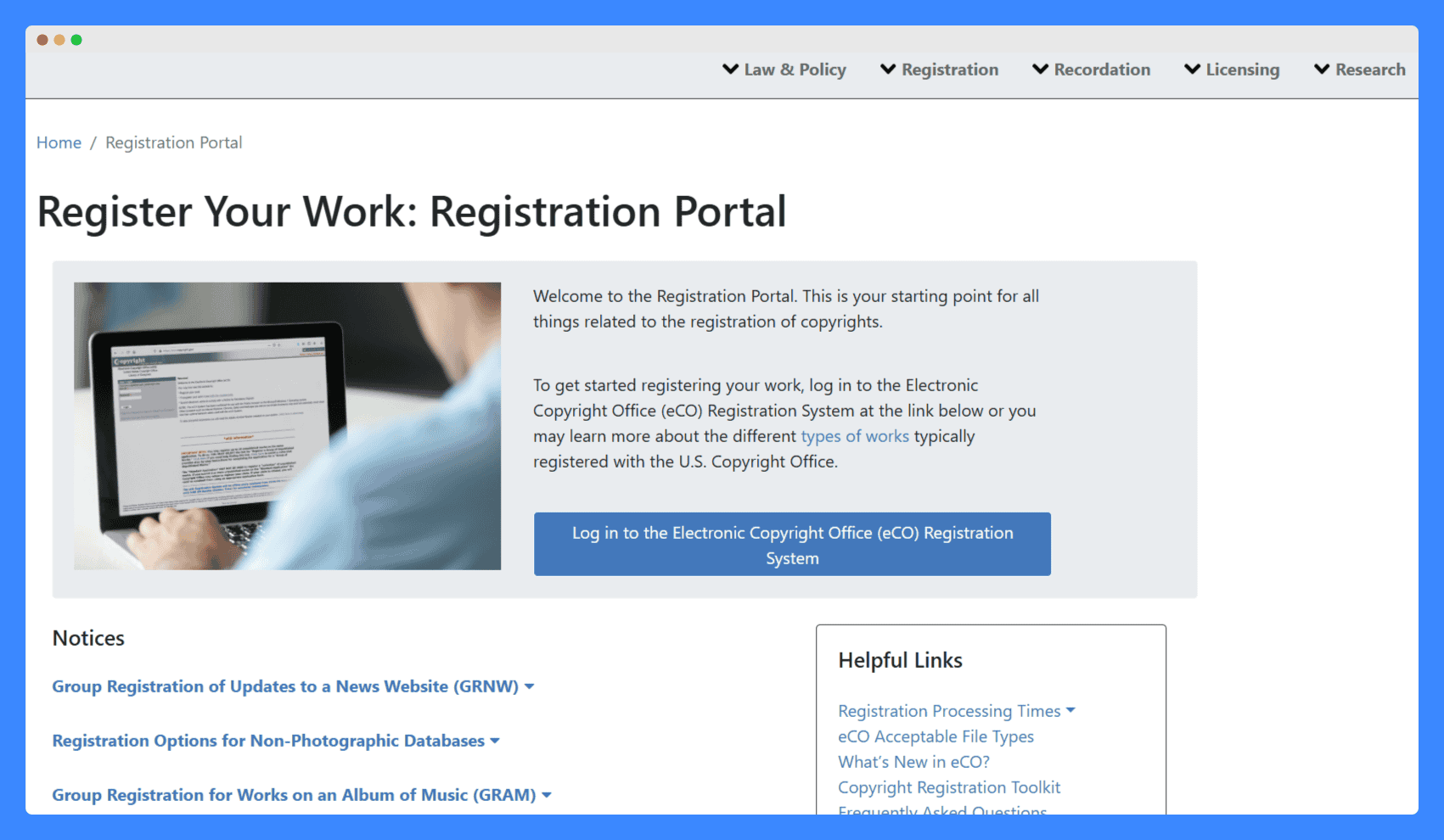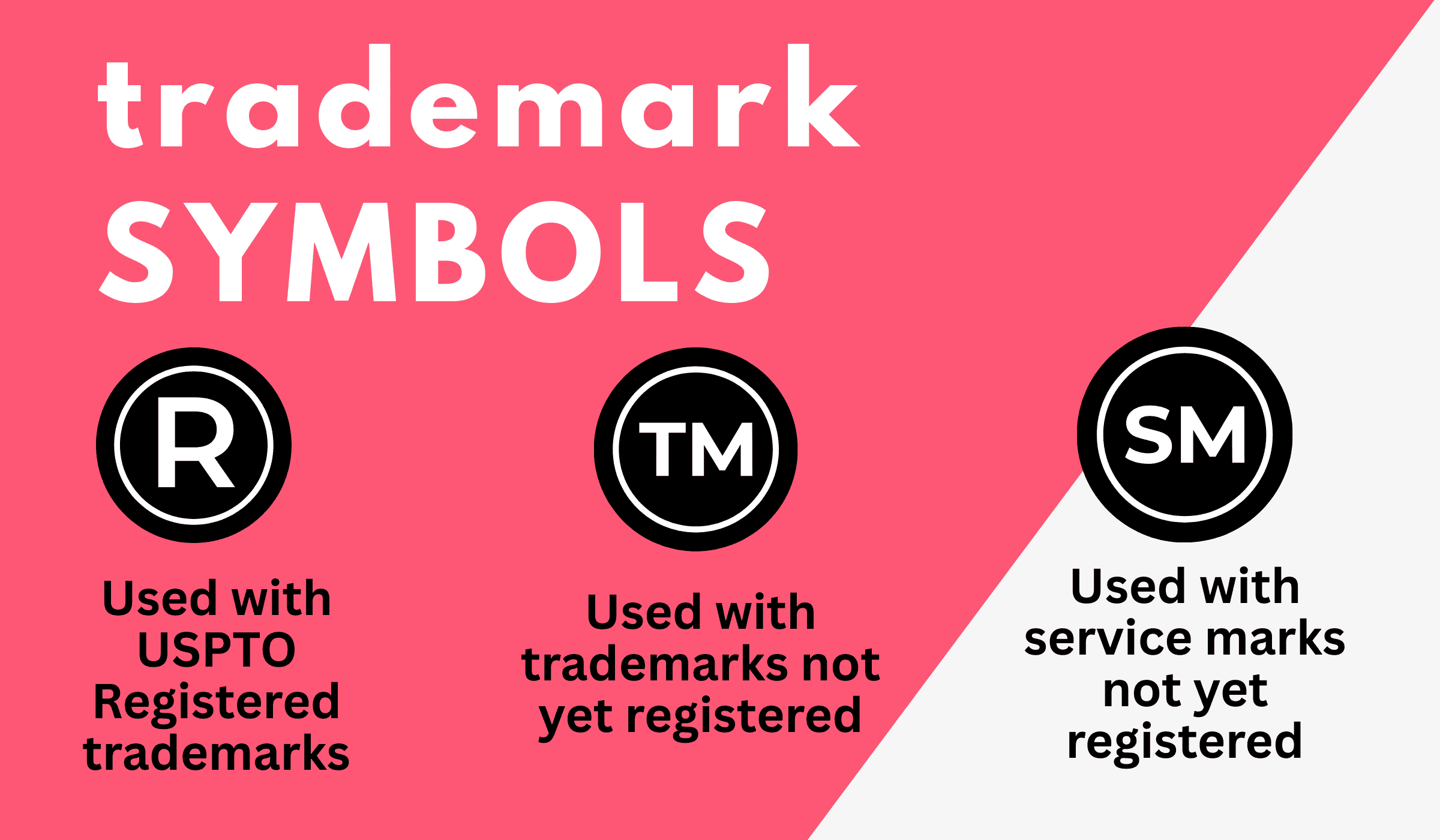As a podcaster, there’s a good chance you invest tons of creative energy into each episode.
You might not think about protecting your valuable work if you’re just getting started, but ensuring legal protection becomes crucial as your audience grows and your show gains visibility.
There’s no question that understanding your rights and how to protect your podcast is a vital step for any serious creator looking to build a sustainable platform and prevent unauthorized use of their content.
Today, our goal is to help you better understand the concept of podcast copyright, as well as why you should consider registering. We will also share actionable steps that will help you get through this process quickly and easily, empowering you to safeguard your audio creations.
Let’s dive in!
Table of Contents
Understanding Copyright
Understanding copyright is foundational for the rest of this post, so let’s start there. Copyright is legal protection and applies to “original works of authorship” that are created through a “tangible medium of expression.” For podcasts, this means your creative efforts become protected as soon as they are recorded or scripted, fixed in that tangible form.
This protection is automatic upon creation and grants exclusive rights to reproduce, distribute, perform, display, and create derivative works. These rights mean that generally, only the copyright holder can make copies of the work, share it publicly, or create new works based on the original.

For podcasters, your work is considered officially protected once recorded or scripted. There are a few different elements that are covered under copyright, reflecting the various creative components of a podcast.
Here are the ones you need to know, along with some elements that are not covered:
- Spoken Word – Scripts, interview recordings (your original contributions and guests, if agreed), storytelling, and original ad-libs fixed in the recording. This covers the specific arrangement and expression of words.
- Sound Recordings – The actual audio fixation of your episode—how sounds are captured, arranged, and produced—is a separate copyrightable work (often noted with ℗). This protects the specific sonic realization of the episode.
- Original Music – Custom theme songs, jingles, and background scores created for the podcast. Both the musical composition and the sound recording of the original music can be protected.
- Sound Effects – Custom-created soundscapes or unique audio effects. If you create original audio effects, they can fall under copyright.
- Cover Art & Visuals – Original logos, episode artwork, and related website graphics. These visual assets are protected separately as pictorial or graphic works.
What Isn’t Typically Covered by Copyright:
- Ideas and Concepts – As a general rule, Copyright protects the expression of an idea, not the idea itself (e.g., the concept for a true-crime podcast vs. a specific episode script). You cannot copyright the general topic of your show.
- Podcast Titles/Names – Generally not protected by copyright due to brevity. While short titles lack the originality for copyright protection, podcast names, and logos can be protected as Trademarks, which identify your brand in the marketplace.
- Facts and Raw Data – Facts are not copyrightable, though an original selection or arrangement of facts can be. While the underlying facts in your research aren’t protected, the unique way you select, arrange, and present them in your narrative can be.
Why Formal Copyright Registration Matters for Your Podcast
While basic copyright is automatic from the moment of creation, formal registration with the U.S. Copyright Office offers significant, practical advantages that dramatically strengthen your ability to protect and leverage your work. It transforms your automatic rights into a more robust and enforceable legal asset.
- Create a Public Record – Registration creates an official, searchable record of your copyright claim and ownership. This public record serves as constructive notice to the world, making it difficult for infringers to claim ignorance. The certificate provides evidence of ownership in court, simplifying legal disputes and due diligence for potential business partners.
- Access to Federal Courts – For U.S. works, registration is generally a mandatory prerequisite to filing a copyright infringement lawsuit in federal court. Without it, your ability to take legal action against those misusing your content is severely limited. Registration is your key to accessing the legal system’s full power to enforce your rights.
- Statutory Damages and Attorney’s Fees – Timely registration (before infringement or within three months of publication) will make you eligible for statutory damages (up to $150,000 per infringed work) and the recovery of attorney’s fees. Statutory damages don’t require proving actual financial harm, which is often tricky with creative works. This dramatically increases the financial viability of pursuing infringement claims.
- A Stronger Deterrent – A registered copyright signals that you are serious about protecting your hard work. This visible record deters potential infringers who recognize your stronger legal standing and access to more significant remedies, making them less likely to target your content.
- Facilitating Business Transactions – Registered copyrights simplify licensing your content or selling your podcast as an asset in the future. A clear, official record streamlines due diligence for potential licensees or buyers, providing them with greater confidence and potentially leading to smoother negotiations and more favorable terms for your creative work.
- International Protection Considerations – A U.S. registration can serve as a basis for protection in other countries through international treaties like the Berne Convention, which grants automatic protection based on national treatment principles. While international copyright exists automatically, a U.S. certificate provides strong foundational proof of your claim to assist in asserting and enforcing rights abroad.
Step-by-Step Guide to Registering Your Podcast Copyright
The U.S. Copyright Office’s Electronic Copyright Office (eCO) portal has streamlined registration, making the process more accessible. While it requires attention to detail, it is manageable if you follow the instructions carefully.

What and When to Register?
- Individual Episodes vs. Group Registration: You can register single episodes. More cost-effectively, the “Group of Unpublished Works” (GRUW) option allows registering up to 10 unpublished episodes with one application and fee if they share the same author(s) and claimant(s). For published series, group registration options for serials may also be available for episodes published within a three-month period.
- Timing is Key: Register as soon as possible, ideally before or within three months of first publication. This timely registration is crucial for eligibility for statutory damages and attorney’s fees in infringement cases. Missing this window means you can only recover actual damages, which can actually be hard to prove. Establishing a regular registration schedule (e.g., monthly or quarterly) is a best practice.
Navigating the eCO (Electronic Copyright Office) Portal:
- Account Creation – Set up an account on copyright.gov. This is your gateway to the online registration system.
- Initiating a New Claim – Select the correct application type. “Sound Recording” (Form SR) is common for protecting the audio content itself. If scripts are primary, consider “Work of the Performing Arts” (Form PA) or “Literary Work.” For group registrations of unpublished episodes, specifically, select the “Group of Unpublished Works” option. Always consult the Copyright Office Circulars for detailed guidance on the best application type for your podcast.
- Completing the Application Form – Provide accurate details: title(s) (both group and individual episode titles for GRUW), author(s) (identifying their contribution like “performance and sound recording” or “text”), copyright claimant(s) (the owner), year of completion, date/nation of first publication (if applicable), nature of authorship (be specific about what you created), and any derivative works or pre-existing material. Double-check all information carefully.
- Paying the Registration Fee – Fees vary based on application type and filing method; check the official U.S. Copyright Office website for current fees. Electronic filing is generally cheaper. Payment is made online.
- Submitting Your Deposit Material – Upload digital copies of your podcast episodes (e.g., MP3, WAV) and any corresponding scripts (PDF) as per Copyright Office guidelines for file formats and quality. For group registrations, ensure all episodes listed are included in the deposit. The deposit provides the Office with a copy of the work being registered.
What Happens Next?
You’ll receive an email confirmation after successful submission. Processing times can vary significantly, often taking several months.
Be prepared to respond promptly if the Copyright Office requests clarification or additional information. If approved, you’ll receive a Certificate of Registration. Your effective registration date is generally the date the Office receives your complete application, deposit, and fee, assuming it’s ultimately approved.
Other Legal Protections for Your Podcast
For the best results and comprehensive protection of your podcasting venture, you’ll want to cover all of your legal bases. Copyright is essential for your creative content, but other legal tools protect your brand and business operations. Here are a few different things you should consider doing:
- Trademark Your Podcast Brand – Before you start heavily promoting your podcast, it’s a good idea to protect your podcast name, logo, and taglines under trademark law so no one else can use confusingly similar marks to identify similar services without your permission. Federal trademark registration with the USPTO grants exclusive nationwide rights, serves as legal proof of ownership, and allows the use of the ® symbol, providing strong public notice of your rights. Conduct a thorough search before investing heavily in branding to avoid potential conflicts.

- LLCs and Business Formation – Forming an LLC or other business entity separates your personal assets from your podcast business, offering crucial liability protection in case of legal claims related to your show. It also improves credibility with partners and may provide tax benefits. Key steps include state filing and creating an Operating Agreement, especially with partners, and maintaining separate business finances.
- Contracts and Agreements: Create detailed written documents and contracts to prevent misunderstandings, define relationships, and clarify ownership or usage rights. Verbal agreements are often difficult to enforce. Here are a few essential contracts you should consider:
- Guest Release Forms – These are crucial for obtaining the necessary rights to use guest appearances (voice, likeness, content). A clear release form prevents guests from later claiming copyright in their contributions. Always have them sign before recording.
- Collaboration Agreements – For co-hosts or other regular contributors, outlining roles, responsibilities, copyright ownership (e.g., joint work, licensed contributions), revenue/expense sharing, and clear exit strategies is essential to avoid potentially show-ending conflicts down the road.
- Sponsorship Agreements – Clearly detail deliverables, payment terms, usage rights for sponsored content, and exclusivity. Transparency is key, and you must always disclose sponsorships and affiliate partnerships to your audience.
- Work-Made-for-Hire/Independent Contractor Agreements: – If you hire freelancers (for music, art, scripts, etc.), a written agreement is critical. A work-made-for-hire agreement clarifies that you own the copyright from creation. Without such an agreement, the freelancer typically owns the copyright to the work they create for you, even if you paid them.
Music, Clips, and Fair Use
Using content created by others means you need to be extremely careful and make sure you’re not infringing on someone else’s copyright during your show. Finding something online or hearing it elsewhere doesn’t mean it’s free to use.
Here are a few key considerations:
- Licensing Music – The “30-second rule” is a myth; any unauthorized use of copyrighted music can be infringement, even short clips. To legally use music created by others, you generally need a license. Legal options available include:
- Royalty-Free Music Libraries – Pay an initial or subscription fee for a license to use music according to specified terms. Always read license terms carefully (e.g., commercial use, attribution).
- Creative Commons Licensed Music – Understand and comply exactly with specific CC license terms (Attribution, NonCommercial, NoDerivatives, ShareAlike). Ensure the license permits commercial use if your podcast is monetized.
- Direct Licensing from Artists/ Publishers/ Labels – For popular commercial music, you typically need both a sync license and a master use license. This is often complex and costly for independent podcasters.
- Creating Original Music – Commissioning custom music with an explicit work-for-hire agreement or copyright assignment, or creating it yourself, is often the safest option to ensure you own all necessary rights.
- Using Audio Clips and Soundbites: – Using clips from movies, TV, other podcasts, etc., generally requires permission from the copyright holder(s). Short clips for direct news reporting, critical commentary, review, or parody might fall under Fair Use, but this is a highly fact-specific and risky area requiring careful analysis.
- Fair Use (Section 107 of Copyright Act) – Fair use allows people limited use of copyrighted material, even if they don’t have permission, for purposes such as criticism or commentary. However, it is a complex legal defense raised if you are sued for infringement, not a right to use the material freely. Courts balance four factors, including Purpose and Character of the Use, Nature of the Copyrighted Work, Amount and Substantiality of the Portion Used, and Effect of the Use Upon the Potential Market for or Value of the Copyrighted Work. Transformative use is often key, but Fair Use is never guaranteed.
- Public Domain Content – Works with expired copyright, those dedicated to the public domain (e.g., CC0), or certain government works can be used freely. It’s crucial to make sure that what you want to use is genuinely in the public domain before using it, as copyright terms are very long. Reputable sources like the Library of Congress can help verify status.
Final Thoughts
Proactively managing your podcast’s intellectual property is essential to your long-term success and sustainability as a creator. It’s about protecting your creative investment and building a valuable brand.
While basic copyright is automatic, formal registration with the U.S. Copyright Office provides powerful, actionable protection for your work, giving you significant legal leverage. It provides legal recourse against infringement, establishes clear public ownership, and gives you peace of mind knowing your hard work has a recognized legal shield.
Understanding copyright, the specific benefits of formal registration, and how to utilize other crucial legal tools like trademarks and contracts can help you confidently navigate the complexities of podcasting and many of the challenges that come with creating something new and sharing it with the world.
Investing a little time in understanding these concepts now can save you significant headaches and potential legal battles down the road.


